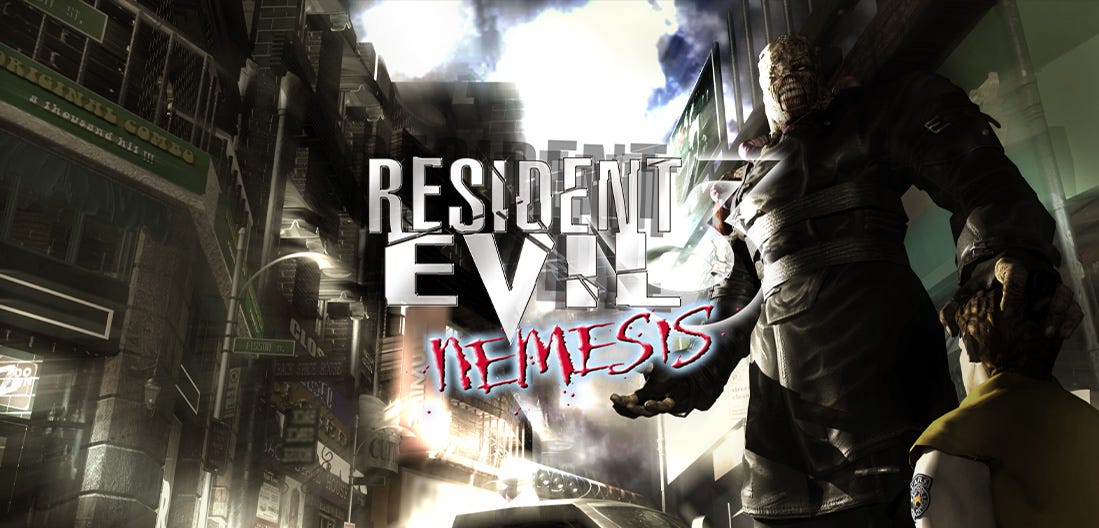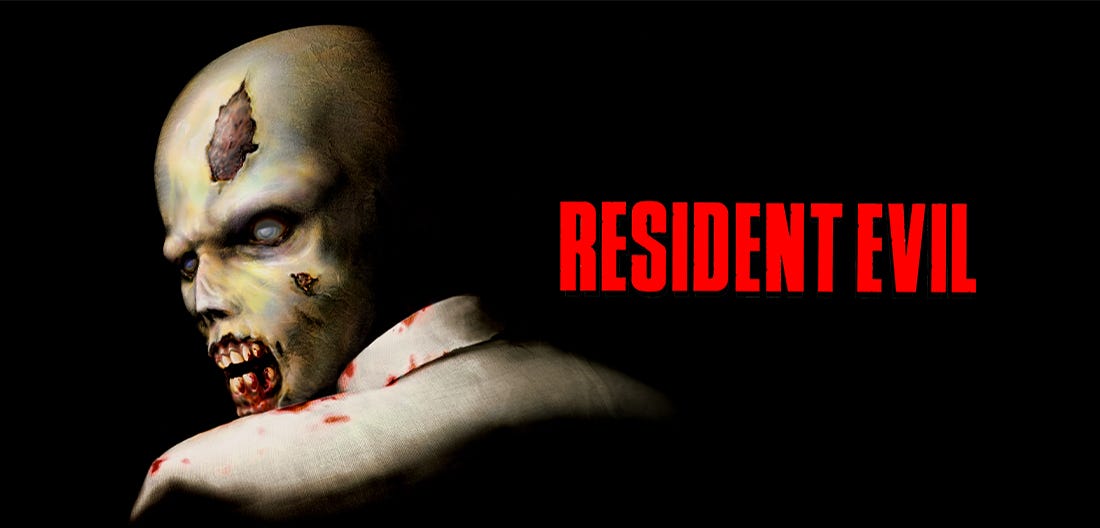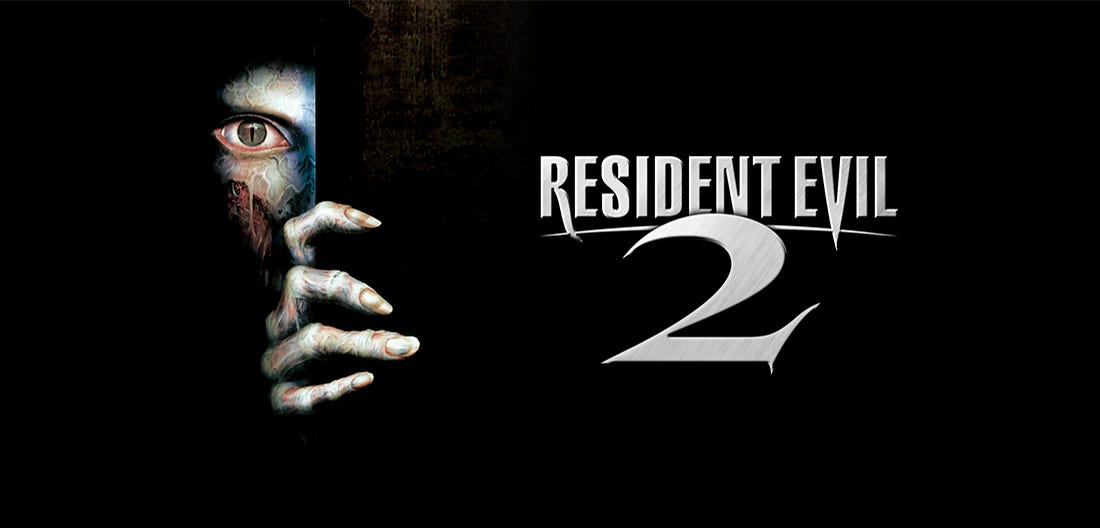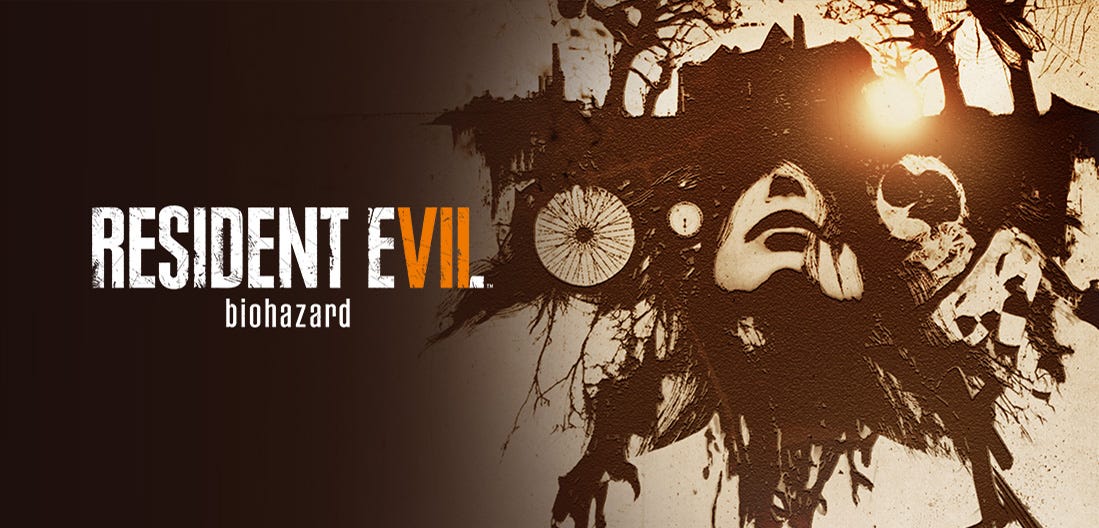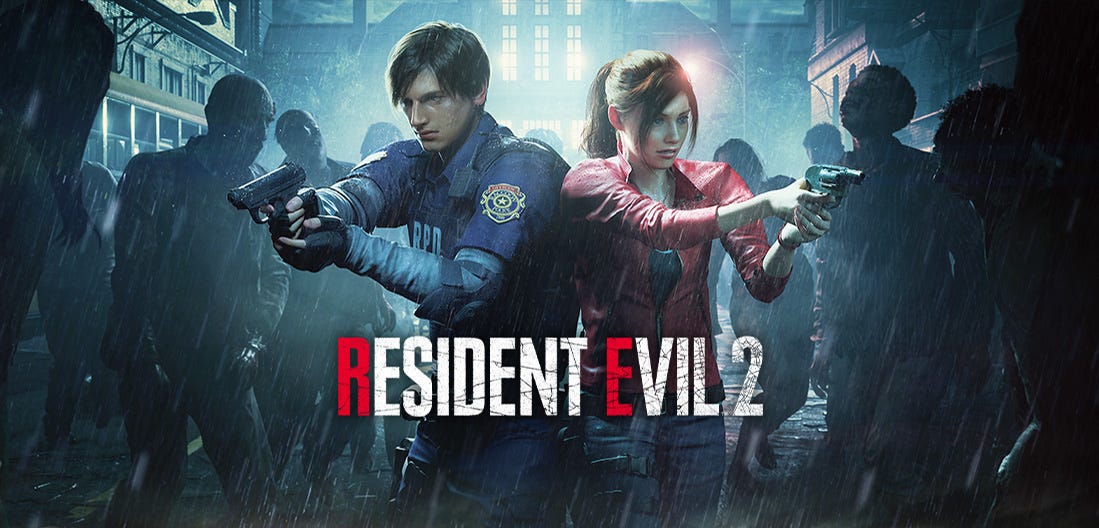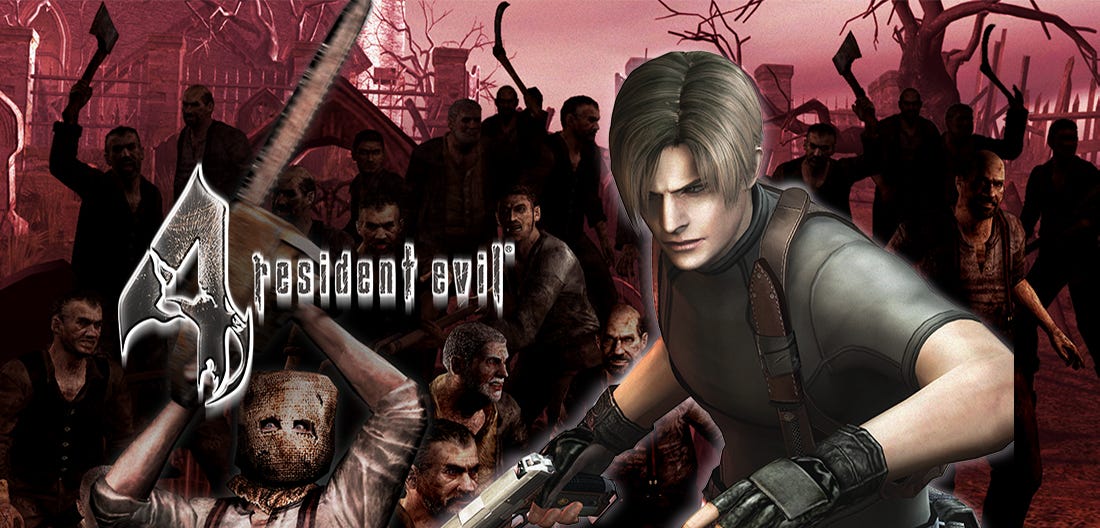My 10 Favorite Resident Evil Games
January is the month of many RE anniversaries, inspiring me to look at my favorite games in the series
The month of January has become a unique time of year for the Resident Evil franchise. Even if there’s absolutely nothing going on with the IP in general, which has been the case for January 2024, those who follow Resident Evil accounts on social media are sure to be reminded of the flurry of anniversaries that fall during the month. Going down the list, we have:
1998 - Resident Evil 2 (PlayStation)
2000 - Resident Evil Survivor (PlayStation)
2005 - Resident Evil 4 (GameCube)
2012 - Resident Evil Revelations (Nintendo 3DS)
2017 - Resident Evil 7: Biohazard (PlayStation 4/Xbox One/PC)
2019 - Resident Evil 2 (PlayStation 4/Xbox One/PC)
In addition, the following ports/re-releases were also launched in January:
2003 - Resident Evil 2 (GameCube), Resident Evil 3: Nemesis (GameCube)
2006 - Resident Evil: Deadly Silence (Nintendo DS)
2015 - Resident Evil HD Remaster (PlayStation 4/Xbox One/PC)
2016 - Resident Evil 0 HD Remaster (PlayStation 3/PlayStation 4/Xbox 360/Xbox One/PC)
That’s a lot of RE games releasing at the beginning of a given year. While other time frames such as the month of March or the end of the year have seen their fair share of releases, January certainly has the lion’s share of milestone releases for the IP. The original RE2 and RE4, as well as RE7 and the RE2 remake, are some of the best entries in the series and hold a significance in series history for one reason or another; RE4 and RE7 rescued the IP from the brink of irrelevance.
The recent anniversaries had me, once again, wondering what my favorite RE games are, and why. Every RE fan will have their own hierarchy of most liked and most disliked entries. While quality is ultimately the determining factor for me, I want to note that having directly spoken with most of the IP’s creators at some point or another, I tend to place a higher priority on creator intent and implementation than others may (or may not). I do think my Top 10 has been mostly stable for the past 5 years, since the release of RE2 remake in 2019, but there have been some recent updates thanks to the release of both Village and RE4 remake.
I want to preface that, counting every significant original entry in the IP, whether a spin off, remake, numbered title, or otherwise, there are now over two dozen RE entries out there. As a result, my entire top 10 are deeply cherished games. Heck, I’d say that about the next five games that don’t make it to the top 10 but would be in the top 15.
With that, allow me to go down the list of my 10 favorite Resident Evil games.
10. Resident Evil: Village (2021)
Ranking 10th is the relatively recent 8th numbered entry, Village. I appreciate what Director Morimasa Sato tried to do with the game: take the spooky first-person design from RE7 and dial things up a few notches, while taking significant inspiration from the original RE4.
When playing Village for the first time in April 2021 (I had access to a review copy), I remember being constantly surprised at how the story unfolded as the game went on. The Beneviento House segment is one of my favorite set pieces in series history. The overall presentation was so different from what I had come to expect from the series, and I found it refreshing and well-presented.
But Village also is far from perfect. The Factory is truly one of the worst stages in the entire IP, the pacing is somewhat uneven, and I found the 2022 Shadows of Rose DLC uninteresting and inconsequential. But despite those shortcomings, Village is a great entry and one I will continue to enjoy for years to come.
9. Resident Evil 4 (2023)
Next up is the RE4 remake. I think readers will find this relatively lower placement to be one of two controversial choices in this ranking. RE4 remake was released 10 months ago to near-universal acclaim; it’s Metacritic and OpenCritic scores are the best in the RE franchise since the original RE4. The team, led by Co-Directors Yasuhiro Anpo and Kazunori Kadoi had their work cut out for them in remaking such a beloved game, and in most reasonable and objective measures, they were immensely successful. RE4 remake is a well-designed modern experience that deepens the lore of the original, while correcting the unenforced errors of the 2020 Resident Evil 3 remake and keeping a vast majority of the elements that made the original RE4 so iconic. The Separate Ways Ada Wong DLC that was shadow dropped in September 2023 is also easily the best additional content the series has ever seen, in terms of depth, production values, and overall quality.
So why doesn’t it rank any higher on my top 10? To put it simply, I just didn’t find the overall experience as memorable or groundbreaking as the original RE4. I prefer the slightly faster and more responsive gameplay of the original compared to the remake’s slower and heavier feel. While the original, especially with the benefit of hindsight, has an incredibly silly and absurd premise, I think that ultimately helped the game stand out. The remake attempting to be more grounded makes for a better narrative, but it subsequently loses the edge of the original at the same time.
Back in 2005, there was nothing out there quite like RE4. RE4 redefined my assumptions on what was possible to experience in video games, and clearly the long list of game creators who were inspired by the original RE4 agree. With RE4 remake, what I got was an enjoyable but ultimately predictable experience, one made possible by taking a great product from 2005 and enhancing it with the latest technology and game design ethic. Unlike the RE2 and RE3 remakes, going from OG RE4 to RE4 remake was always going to result in a diminishing return. And in that sense, while an excellent game overall, RE4 remake also doesn’t feel that special in the end.
8. Resident Evil 3: Nemesis (1999)
I will never not be fascinated by how the third numbered RE came to be. It began as a spinoff meant to hold people over until more important sequels could be released. Unfortunately, those other products ended up getting delayed, and for various political reasons, the spinoff game was converted at the 11th hour into what we now know as Resident Evil 3: Nemesis. To this day, Director Kazuhiro Aoyama doesn’t agree that RE3 should have been RE3, but nonetheless, he's proud of the game’s impact on the franchise, especially from a pop culture perspective. RE3 solidified Jill as an iconic video game protagonist, while Nemesis became video gaming’s definitive stalker villain. RE3 was even reinterpreted in the Paul W.S. Anderson live-action film series, in Resident Evil: Apocalypse back in 2004.
While not as ambitious or wide-scale as the other fixed-camera angle RE games, RE3 made up for it with interesting gameplay design, such as branching paths, live selection events, multiple endings, randomized puzzle solutions, ammo crafting, and the dodge mechanic. Excellent visuals and a strong soundtrack reinforce the whole package. It’s truly baffling, if not outright unfortunate, that nearly none of these quality of life designs made it to any future RE games, including the 2020 remake (which, uncoincidentally, is not in this top 10 ranking).
7. Resident Evil (1996)
The very first RE ranks in at number 7. I wasn’t always as fond of RE1 as I am today, primarily because I was once of the thought process that the 2002 remake made it obsolete. While that’s certainly true for many more casual players, it’s just hard for me not to appreciate the various challenges Director Shinji Mikami and Producer Tokuro Fujiwara had in even getting this game out the door. There was only a handful of horror game reference during the mid-90s, and while the original PlayStation was a powerful system, it still presented various technical limitations. Mid-90s Capcom had no clue how to film high quality cut-scenes or source high quality voice acting. The game almost got cancelled because Boston Consulting Group didn’t see it as worthwhile. Capcom could have gone bankrupt at any time. All of that paved way for the original RE, and the things it’s known for, both the good and the unflattering.
RE is an archaic game by modern standards, but there are enough differences between it and the remake that make RE1 worth playing today. It boasts faster and simpler gameplay, which makes it more suitable for casual gameplay sessions. This is especially true with the 2006 Nintendo DS port, Resident Evil: Deadly Silence, which lets you skip door loading scenes. (Seriously, more console ports need this functionality.) I find the simplicity to be part of the charm, in the same way that someone may elect to play through the original Super Mario Bros. even if more technically and creatively competent entries exist. The original is still a fun experience, and currently accessible on PlayStation 4 and PlayStation 5 via Sony’s PS Plus service.
6. Resident Evil CODE: Veronica (2000)
Along with RE4 remake’s placement, readers may disagree with where I put Resident Evil: CODE: Veronica. It’s been interesting to see public opinion turn on CV over the past two decades. Back in 2000, CV was seen as a Dreamcast darling (it was developed by a Sega-owned studio, not internally at Capcom) and earned very strong reviews in all the major game outlets. Today, many gamers in the West deride its perceived difficulty and gameplay design issues, as well as its story, characterizations, and themes. The lack of a number in the title has led newer RE fans to incorrectly dismiss the title’s significance altogether. For what it’s worth, I rarely see the same negative reaction towards the game in Japanese fan circles. I have some theories as to why that may be, all of which are beyond the purview of this article.
As readers may know, CV was the first RE game I ever played, and I found it so enjoyable that it made me an RE fan for life. While I certainly don’t consider my opinions to be any more important than anyone else’s, I also don’t think the average diehard fan of any IP would get into it so deeply if they started with something that wasn’t actually good.
To this day, I enjoy CV’s gameplay design, which is a modified take on that of RE2, with the zapping system swapped out for a longer and more varied scenario that switches between Claire and Chris to form a complete story. The music is among the series’ best, and I enjoy the variety of stages, puzzles, and enemies. It’s not a perfect game and there are numerous archaic issues, but beneath all that is a strong game. Hopefully Capcom finally wakes up and decides to remake it, because it deserves it more so than anything else at the moment.
5. Resident Evil 2 (1998)
What’s there not to love about Hideki Kamiya’s RE2 that hasn’t been said over the past 26 years? RE2, after a tumultuous development cycle, broke sales records and transformed survival horror into a mainstream video game genre. With a memorable cast, great music, gory visuals, and addictive gameplay, the original RE2 is such a well-rounded experience, which in my opinion is notable given that RE is a franchise often criticized for doing too much or too little in any given entry. RE2 has stood the test of time for me, even after the release of its even-more amazing remake, and to this day I enjoy both entries.
4. Resident Evil 7: Biohazard (2017)
I will never forget the moment during E3 2016 when the lid on RE7 was finally lifted. The Beginning Hour dropped on PlayStation 4 soon after, and I became incredibly curious to see how the full game would go. In January 2017, the game released early at game retailers in the Middle East, and I had Mo, my friend and business partner from Kuwait, send me a copy to Japan via DHL Next-Day Guaranteed just so I could play it that much earlier.
What an experience! Director Koshi Nakanishi and his team successfully went back to the roots of the franchise, eschewing explosive action in favor of slower, methodical gameplay and an emphasis on horror and fear. Excellent puzzles, largely strong pacing, and a great cast make RE7 such a joy to replay, even after seven years. It’d been 12 years since I found my jaws dropping on the floor when playing an RE game.
I want to mention that RE7 is still my favorite rendition of VR RE to date, even taking into account Resident Evil 4 VR on Meta Quest 2 and Resident Evil: Village VR Mode and Resident Evil 4 VR Mode for PlayStation VR2. While the newer games are more advanced and interactive, I like how RE7 VR is still more accessible for players like me who don’t care for the realistic arm movements that the newer titles require. I also find that RE7’s cutscenes and stage design lend themselves better to VR.
And as I’ve said many times before, I’ll always be thankful to RE7 for rescuing the RE IP after the damage Resident Evil 6 dealt to it a few years earlier.
3. Resident Evil (2002)
Who doesn’t love Shinji Mikami’s 2002 RE remake? To me and many fans, it’s the pinnacle of the classic formula: stunningly realistic graphics, polished gameplay, incredibly clever puzzles, a fun cast, memorable villains like Lisa Trevor, and a plethora of tricks intended to trip up veterans of the 1996 original. It’s crazy to believe that the two versions of RE1 are only separated by six years; single console lifecycles now typically last longer than that!
The 2002 remake managed to preserve the spirit of the original without changing too much as to make it unrecognizable. As I mentioned earlier, it even outright replaces the original for certain players, and I completely understand why. Fans (including me) are now wondering if Capcom would actually go back to RE1 for another remake, this time in full 3D with an over-the-shoulder perspective. If Capcom decides to do so, hopefully they figure out how to marry the game’s iconic set pieces with modern technology and gameplay.
2. Resident Evil 2 (2019)
When I finished my first playthrough of RE2 remake (Leon’s 1st Run), I was speechless and absolutely blown away. I couldn’t believe how fantastic the experience was. There were significant changes from the original RE2, but most of them were for the better. The world was recognizable, the characters fully fleshed out, the villains and monsters menacing. I immediately had to see more, and started Claire’s 2nD Run scenario, and my feelings were solidified. This was easily the best RE since RE4, and significantly better than RE7.
Along with the first remake, I consider the 2019 RE2 remake to be the embodiment of what makes the perfect RE, but for different reasons. After several attempts spanning nearly a decade, Capcom finally figured out how to marry RE’s puzzle design, exploration style, combat mechanics, and existing cast/story with the perfect balance (unlike, say, Resident Evil: Revelations, which certainly tried do the above but didn’t quite go the distance).
Both the OG RE4 and RE7 had to eschew various series elements to achieve certain goals, but RE2 remake unapologetically embraces the best of RE and molds it together so perfectly. RE2 remake shows us that you don’t have to abandon the series’ signature elements to remain relevant or delivery high quality experiences…
1. Resident Evil 4 (2005)
…and yet, the best RE to date is the one that, by Shinji Mikami’s own admission, had to abandon almost everything the RE series was known for in order to ensure the survival and evolution of the IP.
The 2005 version of RE4 is still my favorite RE to this day. RE4 redefined gaming for me and many others, and there isn’t much that has come since then that replicates the same feelings of awe and wonderment. The first time going through the village siege against Dr. Salvador, fighting Del Lego and El Gigante, storming Salazar’s Castle, encountering the Regenerators, facing off against Jack Krauser, and finally rescuing Ashley and escaping in a jet-ski… I personally didn’t think the RE series could go in a direction like this (certainly another IP like Devil May Cry could have), but it did, and I didn’t hate it.
RE4 went on to inspire franchises like Dead Space, Gears of War, The Last of Us, and countless others. I recognize that the original has, for all intents and purposes, been succeeded by the 2023 remake, but I still think the 2005 title will continue to be fondly remember and recognized for its immeasurable impact in gaming. At the very least, I hope the gaming community doesn’t forget about it.






